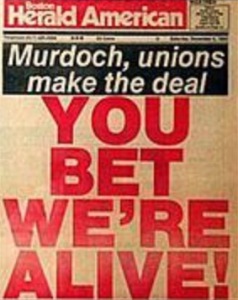Chris Sweeney has written a sharp piece for Boston magazine on the state of the Boston Herald, the city’s number-two daily. As is generally the case with stories about the Herald, the overarching theme is: How much longer can the struggling tabloid cling to life?
And yet I wonder if that’s the right question. For a decade starting in the mid-1990s, I covered the Herald‘s ups and downs as the media columnist for the Boston Phoenix. If I had a dime for every person who told me the Herald had six months to live, I’d be a very rich man. Sadly, it was the Phoenix that didn’t survive.
As Sweeney notes, the Herald these days seems more like an extension of its online radio station than a standalone newspaper. Nearly two years ago editor Joe Sciacca gave me a tour of the paper’s new headquarters in South Boston, and I was impressed with what I saw—especially the amount of space devoted to multimedia and to the modern radio facilities.
My WGBH colleague Jim Braude tells Sweeney that not many people may be listening to Boston Herald Radio (OK, Braude’s actual quote is “I don’t think anyone listens”). But Braude also points out that it’s given the Herald a jolt of relevance in terms of high-profile guests like Mayor Marty Walsh, Governor Charlie Baker, and Donald Trump, whose appearances can then be written up and tweeted out.
Unfortunately, none of the top three executives at the Herald would speak with Sweeney, a group that comprises publisher Pat Purcell, Sciacca, and executive editor John Strahinich. It would have been useful to get some insights from them regarding the Herald‘s current business model. Not that I’m faulting Sweeney—I’ve been there. And his description of trying to get Strahinich to talk is pretty amusing.
But even though print circulation has shrunk precipitously and print advertising revenue is presumably scarce, the Herald does have some strengths. Sweeney does not report the size of the staff, but it’s small and therefore affordable. The sports section is very good. The website is slow and frustrating, but the third-party mobile app is excellent—and includes one-click access to Herald Radio. Purcell made a lot of money selling off the old headquarters in the South End; the Herald is now printed by the Boston Globe, which means that its larger competitor has every reason to keep its rival breathing.
So how long can the Herald survive? Keep those dimes rolling in.

